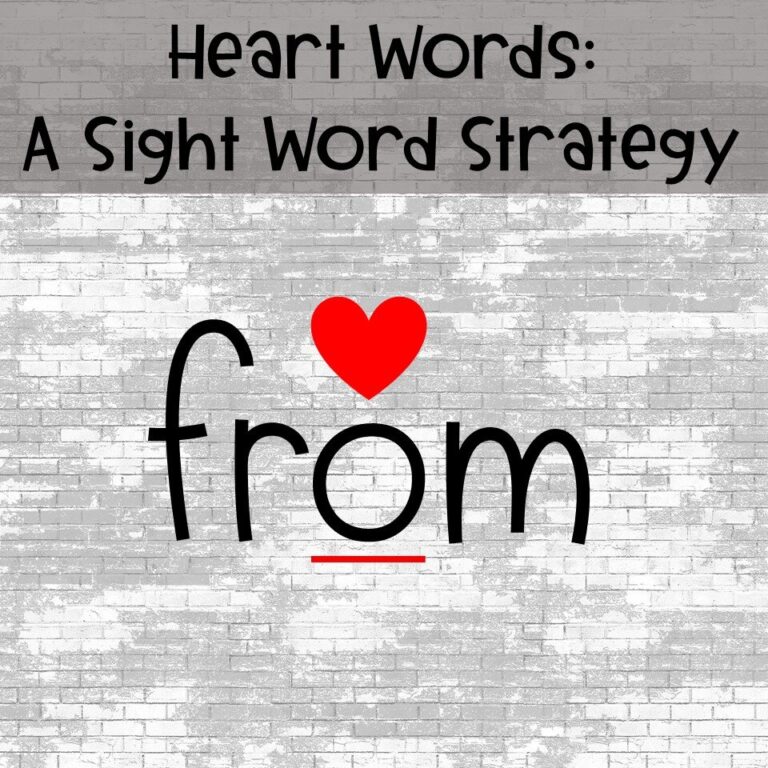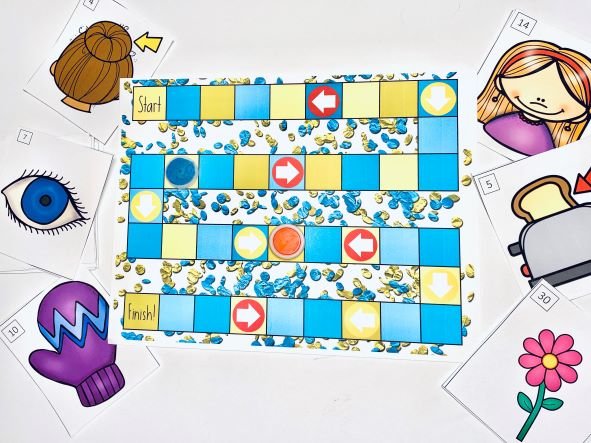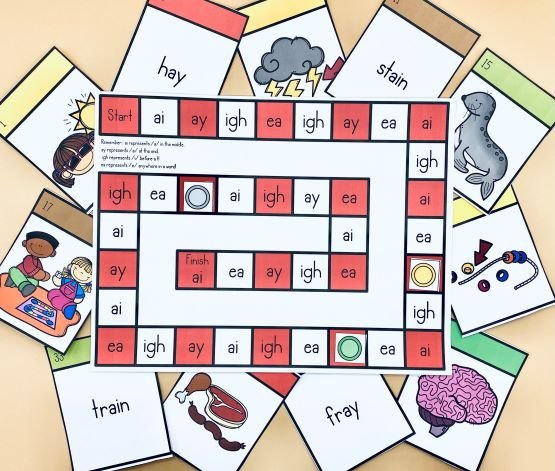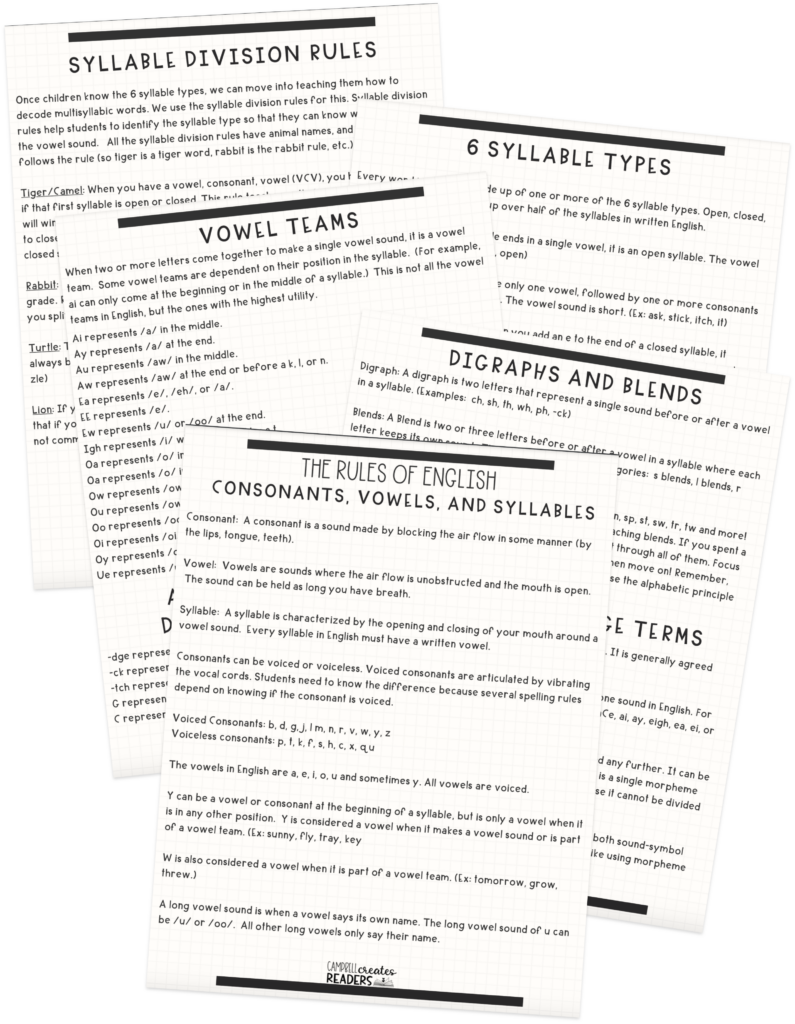
Share This:
There’s nothing quite like a game to take worn-out and wound-up children and bring them back to center. There have been days where I could see that my typical lesson was not going to work, because my kids didn’t have enough gas left in their tank to make it through. It doesn’t happen often, but on those days I give us permission to play a game—a reading one of course.
Today, I want to share with you my favorite games. I hope you love them as much as I do. I have to be honest—a lot of them are my own games. But the truth is that I couldn’t find games that targeted specific phonics skills like I needed them to, so I made my own out of necessity. So, here are some of my favorite games for phonemic awareness, letter sounds, and phonics practice.

Without a doubt, the biggest hit every year with my kindergartner’s is the “shark game.” It’s actually called Alphabet Island, but for my students it will always be lovingly referred to as the shark game. Basically, the student flips over a card, looks at the uppercase letter, then searches on the board for the lowercase equivalent. If they flip over a shark, they must feed one of their cards to the shark. The kids love feeding the shark, and I love the letter reinforcement they get!

This game is intended to help students segment sounds in words. Students flip over a card and will see a picture, like a bun or an eye. They must say the sounds in the word. The students move forward however many sounds are in that word. It’s a simple, yet effective way to reinforce phonemic awareness skills. This game would be perfect for a kindergarten or first grade center!

When the pandemic hit, I needed games that could be played whole-group or virtually. Now that restrictions have lifted, I still find these splat games to be extremely valuable. Splat is a PowerPoint game to practice specific phonics skills. You divide the children into two groups (sometimes I play them vs. me). The groups take turns reading words. If you read the word correctly, you receive 1 point. If you read a nonsense word correctly, you receive 2 points. If you get a Splat on your turn, you get 0 points that round. The group with the most points at the end is the winner.

These games are one of my newest creations, and it’s safe to say they are already a favorite with my own kids (and the teachers at my school). I realized recently that every single game I owned practiced phonics skills at the word level. If I want my children to become proficient readers, I must work to have them become successful at the sentence and connected text level. These decodable sentences games are so easy to prep and play. Students flip over a card, read the sentence, and keep the card. There are special cards in the deck where they may lose cards, gain cards, or even skip over another player. The person with the most cards at the end of the game wins!

I no longer use most of my Pop games (looking at you Sight Words Pop). But the Pop for Letters game is still a fan-favorite of my kindergarteners. Students pick a letter out of the popcorn box, say either its name or sound (you choose before the game starts), and keep that piece of popcorn. If they get a “Pop!” piece, they lose all their popcorn pieces. It is such an easy game, and the children never seem to tire of it!

All the board games I could find were too complicated and didn’t really target skills like I wanted. So, you guessed it, I made my own. For $20, you can get all 26 of my phonics boards games that practice short vowels, digraphs, blends, ABCs, magic e, vowel teams, r-controlled vowels, and diphthongs. The great thing about these is that all the games are pretty similar to play. So, if you teach it to your students for one skill, they can easily learn to play another one of the games with a different skill!

This game is a little bit out in left-field, but it is one of my favorite games for older kids. Essentially, students have a word they need to get others to say, like “caterpillar.” But here’s the rub: they have to describe it without using the words “butterfly,” “insect,” or “wings.” Basically, children are trying to describe a concept, without using its most familiar attributes. It is a perfect game to play during those transition times if you just have a minute or two. I play it where the person who guesses correctly gets to be the next person to have others guess.

Bingo games are great because they can be played with a virtually unlimited number of students. Small-group or whole-group, bingo games work. I’ve made a bunch of them to help students practice, you guessed it, specific phonics skills. Whether you are teaching digraphs, blends, vowel teams, r-controlled vowels, etc., these games are fun and easy to play.
When we are choosing a game to play, we’ve always got to ask ourselves, “Is there any significant learning or review happening with these games?” If the answer is no, we have to be willing to let them go. A great example of this is all those sight word games we used to own. Most children aren’t actually learning sight words by playing those games. So if the game does not reinforce what you have taught, it’s not worth the time or money. Whether children are playing games with the teacher or independently in a center, there has to be value in it other than a time-filler. All the games listed above have value, but they can never replace direct, explicit instruction from the teacher!

Savannah Campbell is a K-5 reading specialist. She has taught her entire 12-year teaching career at the school she went to as a child. She holds two master’s degrees in education from the College of William and Mary. Savannah is both Orton-Gillingham and LETRS trained. Her greatest hope in life is to allow all children to live the life they want by helping them to become literate individuals.

Savannah Campbell is a K-5 reading specialist. She has taught her entire 12-year teaching career at the school she went to as a child. She holds two master’s degrees in education from the College of William and Mary. Savannah is both Orton-Gillingham and LETRS trained. Her greatest hope in life is to allow all children to live the life they want by helping them to become literate individuals.
Feeling overwhelmed with all the terminology out there? Want to know the key terms all teachers need to teach phonics? In this FREE Rules of English cheat sheet, you get a 5 page pdf that takes you through the most important terms for understanding English—you’ll learn about digraphs, blends, syllable types, syllable divisions, and move. Grab today and take the stress out of your phonics prep!
